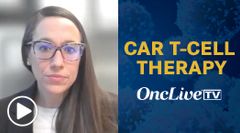
Inside the Clinic: JTCC Experts Highlight Pivotal Ongoing Trials in Multiple Myeloma
David Siegel, MD, PhD, Noa Biran, MD, and David H. Vesole, MD, PhD, discuss ongoing clinical trials in multiple myeloma.
Episodes in this series

David Siegel, MD, PhD, chief, Division of Multiple Myeloma, John Theurer Cancer Center, Hackensack Meridian Health, Noa Biran, MD, associate professor of medicine, Hackensack Meridian School of Medicine, physician, Division of Multiple Myeloma, John Theurer Cancer Center, Hackensack Meridian Health, and David H. Vesole, MD, PhD, director, Myeloma Research, MedStar Georgetown University Hospital, professor of medicine, Georgetown University School of Medicine, co-chief, Division of Multiple Myeloma, director, Myeloma Research, John Theurer Cancer Center, Hackensack University Medical Center, discuss ongoing clinical trials in multiple myeloma.
Despite numerous advances made within multiple myeloma in recent years, research into other therapies has not slowed down, Siegel says. One example of continued treatment development is the next generation of CAR T-cell therapies, including 1 modular CAR T-cell therapy called ACLX-001, which can be ubiquitously programmed to engage 1 or 2 targets, Siegel adds. ACLX-001 is currently in preclinical testing.
Other ongoing clinical trials are examining T-cell redirecting therapy, and the treatment space for patients in the relapsed setting is heading toward agents that modulate the immune system, Biran explains. Additionally, a planned phase 1/2 trial (NCT05199311) will evaluate iberdomide plus carfilzomib (Kyprolis) plus dexamethasone in newly diagnosed multiple myeloma, with the hope of improving short- and long-term outcomes for high-risk patients, Noa continues.
Unlike past options, which could limit patients to 1 treatment type before needing to switch to a different treatment class, patients could conceptually advance from 1 CAR T-cell therapy or T-cell engager to another, Vesole notes. Under this approach, various CAR T-cell therapies could attack specific targets, and preliminary data have demonstrated robust responses with this method, Vesole says. These therapies could provide ample benefit with minimal toxicity, Vesole concludes.










































